The Health bulletin [serial] - University of North Carolina at Chapel Hill
The Health bulletin [serial] - University of North Carolina at Chapel Hill
The Health bulletin [serial] - University of North Carolina at Chapel Hill
- No tags were found...
You also want an ePaper? Increase the reach of your titles
YUMPU automatically turns print PDFs into web optimized ePapers that Google loves.
arms—should adopt the preventive <strong>at</strong>titudetoward disease. Every soldier^ould keep in mind the basic truthth<strong>at</strong> "an ounce <strong>of</strong> prevention is wortha pound <strong>of</strong> cure" and he should befamiliar with the basic principles th<strong>at</strong>can be applied for his protection againstdisease.According to a newspaper announcementseveral weeks ago, an epidemic <strong>of</strong>typhus was raging among the Chinesetroops in Korea. Such a report 10 yearsago would have caused us much concern.Today there is no reason for alarm becausewe are armed with effective preventivemeasures developed in the lastwar with which American troops canbe protected against this ancientscourge. We now have an effectivetyphus vaccine and an even more effectivelouse powder. This incident servesto point up the practical importance <strong>of</strong>military preventive medicine today. Italso emphasizes the fact th<strong>at</strong> this youngspecialty is not st<strong>at</strong>ic but is vigorous,rapidly growing, and has infinite possibilitiesfor further development; thisis important because the n<strong>at</strong>ion nowfaces the most serious thre<strong>at</strong> for itsentii'e existence. We must immedi<strong>at</strong>elytake steps to strengthen our total healthdefenses in order to conserve bothfighting and working manpower.Since 25 June 1950, the Armed Forceshave been faced with the problem <strong>of</strong>maintaining the health <strong>of</strong> our troopsfighting in Korea and <strong>at</strong> the same timeplanning for the prevention <strong>of</strong> diseaseamong the large forces now being mobilizedand trained to meet the thre<strong>at</strong> <strong>of</strong>a third global war. <strong>The</strong> civil popul<strong>at</strong>ionis faced with the equally difficult problem<strong>of</strong> strengthening its program <strong>of</strong>preventive medicine and public healthto conserve industrial manpower and tooper<strong>at</strong>e the expanding health departmentsrequired for civil defense. It istherefore important to take stock <strong>of</strong>the n<strong>at</strong>ion's total health facilities—bothmilitary and civilian—in order to makesound plans for the present emergency.Military Preventive Medicine<strong>The</strong> aim <strong>of</strong> preventive medicine Is toprevent physical and mental disease.<strong>The</strong> <strong>Health</strong> Bulletin August, 1951In civilian medical schools the term"preventive medicine" is commonly restrictedto the prevention <strong>of</strong> disease inthe individual; the term "public health"is applied to the prevention <strong>of</strong> diseaseand the conserv<strong>at</strong>ion <strong>of</strong> health in communitiesor other large aggreg<strong>at</strong>ions <strong>of</strong>people, such as St<strong>at</strong>es or n<strong>at</strong>ions. "Militarypreventive medicine" applies tolarge groups <strong>of</strong> fighting men and thereforeit is comparable to civilian publichealth. Since the beginning <strong>of</strong> historyevery intelligent military leader hasbeen aware <strong>of</strong> the hazards <strong>of</strong> diseaseand has realized the need for somemethod which would protect his troopsagainst sickness. This was true even <strong>of</strong>the barbarians who reluctantly abandonedtheir sick and wounded fightingmen on the b<strong>at</strong>tlefield.An early example <strong>of</strong> an <strong>at</strong>tempt todo something about the American soldier'shealth is afforded by an order,issued by General Washington <strong>at</strong> Peekskillin the Revolutionary War, entitled:"Instructions for Soldiers in the Service<strong>of</strong> the United St<strong>at</strong>es Concerning Means<strong>of</strong> Preserving <strong>Health</strong>." At th<strong>at</strong> timethere was no knowledge concerning thetransmission <strong>of</strong> infectious diseases andthese instructions emphasized cleanliness,camp hygiene, and the disposal <strong>of</strong>feces. <strong>The</strong>se activities are still importantto good health, but we now knowth<strong>at</strong> they are not enough to preventdisease. <strong>The</strong>refore, it is not surprisingth<strong>at</strong> General Washington's troops weredecim<strong>at</strong>ed by numerous epidemics.Conditions were no better in the War<strong>of</strong> 1812, the Mexican War, or in theCivil War. <strong>The</strong> commanders and medical<strong>of</strong>ficers <strong>of</strong> those days must have beendeeply frustr<strong>at</strong>ed <strong>at</strong> their inability tocontrol the diseases which have alwaysaccompanied war.Development <strong>of</strong> basic knowledge.—Inthe period following the Civil War, thefound<strong>at</strong>ion for preventive medicine waslaid. From 1860 to 1900 the medical discoveries<strong>of</strong> Pasteur, Koch, and Lister,and their associ<strong>at</strong>es and followers produceda gre<strong>at</strong> reservoir <strong>of</strong> specific knowledgeabout many <strong>of</strong> the micro-organismswhich cause disease. It is fortun<strong>at</strong>eth<strong>at</strong> during th<strong>at</strong> time a member <strong>of</strong> the


![The Health bulletin [serial] - University of North Carolina at Chapel Hill](https://img.yumpu.com/47242858/150/500x640/the-health-bulletin-serial-university-of-north-carolina-at-chapel-hill.jpg)
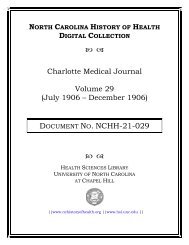
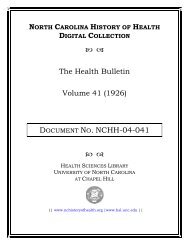
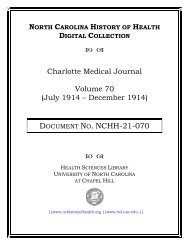
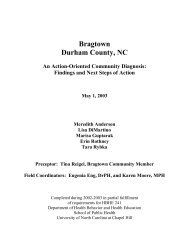
![Bulletin of the North Carolina Board of Health [serial] - University of ...](https://img.yumpu.com/48032016/1/153x260/bulletin-of-the-north-carolina-board-of-health-serial-university-of-.jpg?quality=85)
![The Health bulletin [serial] - University of North Carolina at Chapel Hill](https://img.yumpu.com/47603625/1/169x260/the-health-bulletin-serial-university-of-north-carolina-at-chapel-hill.jpg?quality=85)
![The Health bulletin [serial] - University of North Carolina at Chapel Hill](https://img.yumpu.com/43204263/1/172x260/the-health-bulletin-serial-university-of-north-carolina-at-chapel-hill.jpg?quality=85)
![The Health bulletin [serial] - University of North Carolina at Chapel Hill](https://img.yumpu.com/41981074/1/163x260/the-health-bulletin-serial-university-of-north-carolina-at-chapel-hill.jpg?quality=85)
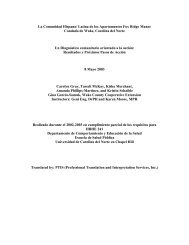
![The Health bulletin [serial] - University of North Carolina at Chapel Hill](https://img.yumpu.com/40912928/1/164x260/the-health-bulletin-serial-university-of-north-carolina-at-chapel-hill.jpg?quality=85)
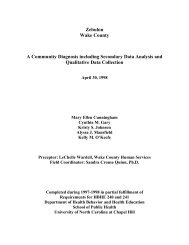
![The Health bulletin [serial] - University of North Carolina at Chapel Hill](https://img.yumpu.com/35643061/1/167x260/the-health-bulletin-serial-university-of-north-carolina-at-chapel-hill.jpg?quality=85)
![Biennial report of the North Carolina State Board of Health [serial]](https://img.yumpu.com/34024350/1/166x260/biennial-report-of-the-north-carolina-state-board-of-health-serial.jpg?quality=85)
